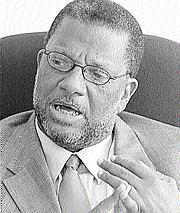
Phillips: It is timely. Ross Sheil, Staff Reporter
The World Bank is calling for donors to give greater assistance to the Caribbean to fight crime which, the institution says, is retarding regional development.
In a report titled: 'Crime Violence, and Development: Trends, Costs, and Policy Options in the Caribbean' the World Bank stated that such is the effect of crime in Jamaica, that reducing it to the level of Costa Rica would boost annual Gross Domestic Product (GDP) by 5.4 per cent. A survey conducted locally by the World Bank revealed that 39 per cent of business managers were "less likely to expand their business because of crime".
The report heavily referenced Jamaica, which has the highest crime rate in the region. It stated that, based on 2002 United Nations data, the Caribbean is the most murderous region in the world, with an annual murder rate of 30 per 100,000 population.
Drug trafficking
Trafficking of cocaine - transhipped through the Caribbean and consumed in developed countries - is at the centre of the problem, said the report, which was produced with the United Nations Office on Drugs and Crime (UNODC) and released yesterday via a video press conference from the World Bank's Washington headquarters.
The report also recommends that the United States, United Kingdom and Canada assist in rehabilitating deportees returning to the region.
"This has been an issue that had somewhat been ignored to date by donors and development institutions on the grounds that crime is somehow separate to development. This report is arguing very strongly that crime andviolence are development issues and as such require a concerted and coordinated response," said World Bank Country Director for the Caribbean, Caroline Anstey.
Emphasis welcomed
Minister of National Security Dr. Peter Phillips, who had not seen the report, welcomed its emphasis which, he said, echoes the message he has delivered to donors; and has increasingly been recognised in the aid programmes of donors, such as the United States and United Kingdom governments.
"I think this is timely because we have to recognise that transnational and organised crime have been advanced during globalisation and certainly the Caribbean is located where it needs support," he told The Gleaner.
"There is no doubt that crime is the major impediment to development," he added. "Much needs to be done to address the social problems which provide the route through which people are drawn into crime and violence."
Mrs. Anstey said the report would be presented to other donors including at the bilateral Vision 20:20 conference between the United States and CARICOM to be held in Washington this June. The report also calls for Caribbean countries, with donor cooperation, to modernise their judicial systems to a more performance related approach as well as investing further in social initiatives to reduce poverty and thus the causes of crime.
According to Liaison officer for Jamaica, and former University of the West Indies (UWI) economist, Dr. Wayne Henry, the World Bank has itself already started a similar policy shift. It's current US$29 million Inner City Basic Services for the Poor (ICBSP) targets social issues and infrastructure in 12 communities islandwide.
ross.sheil@gleanerjm.com

